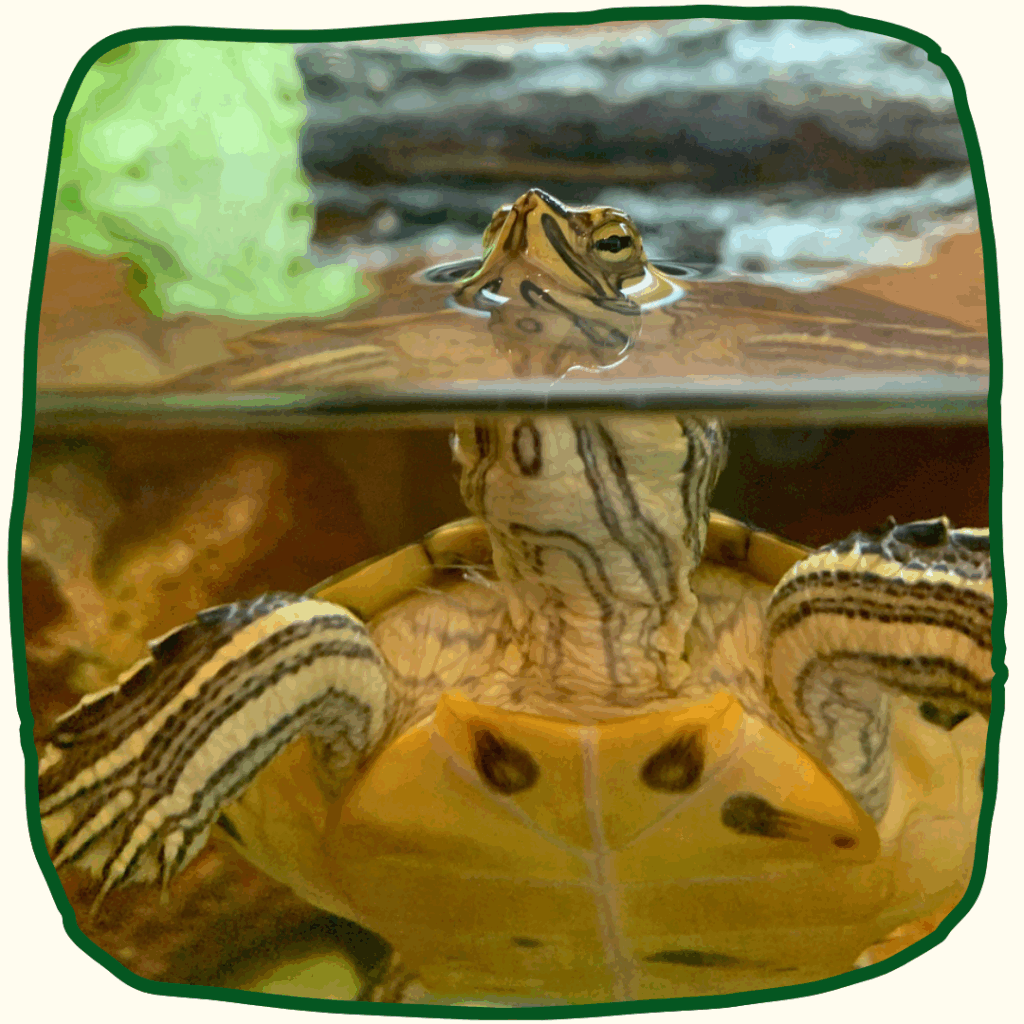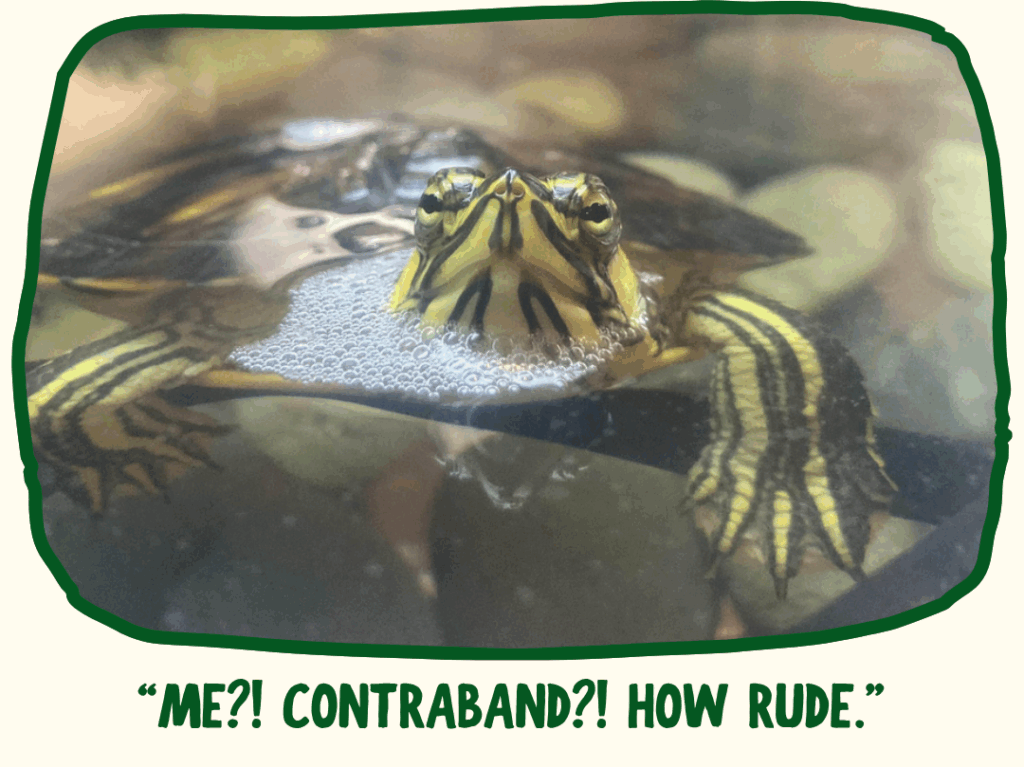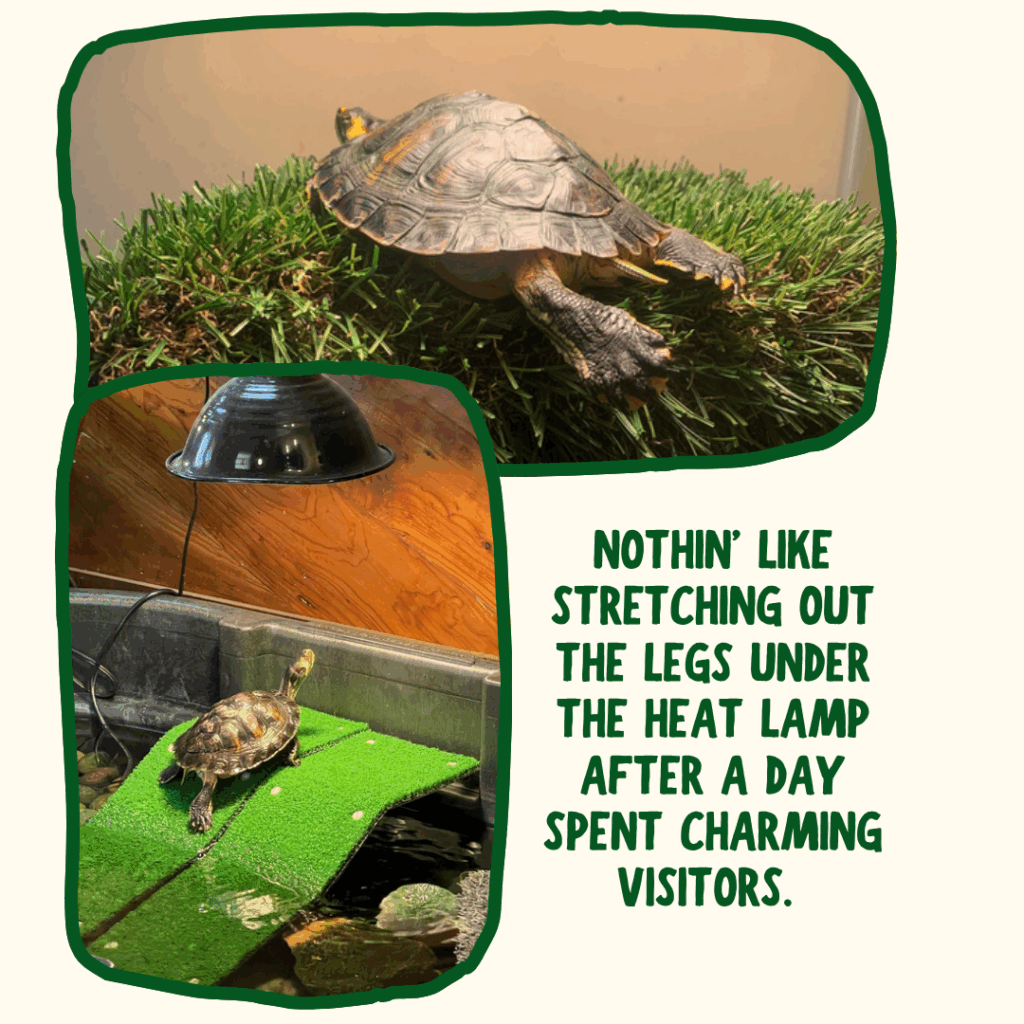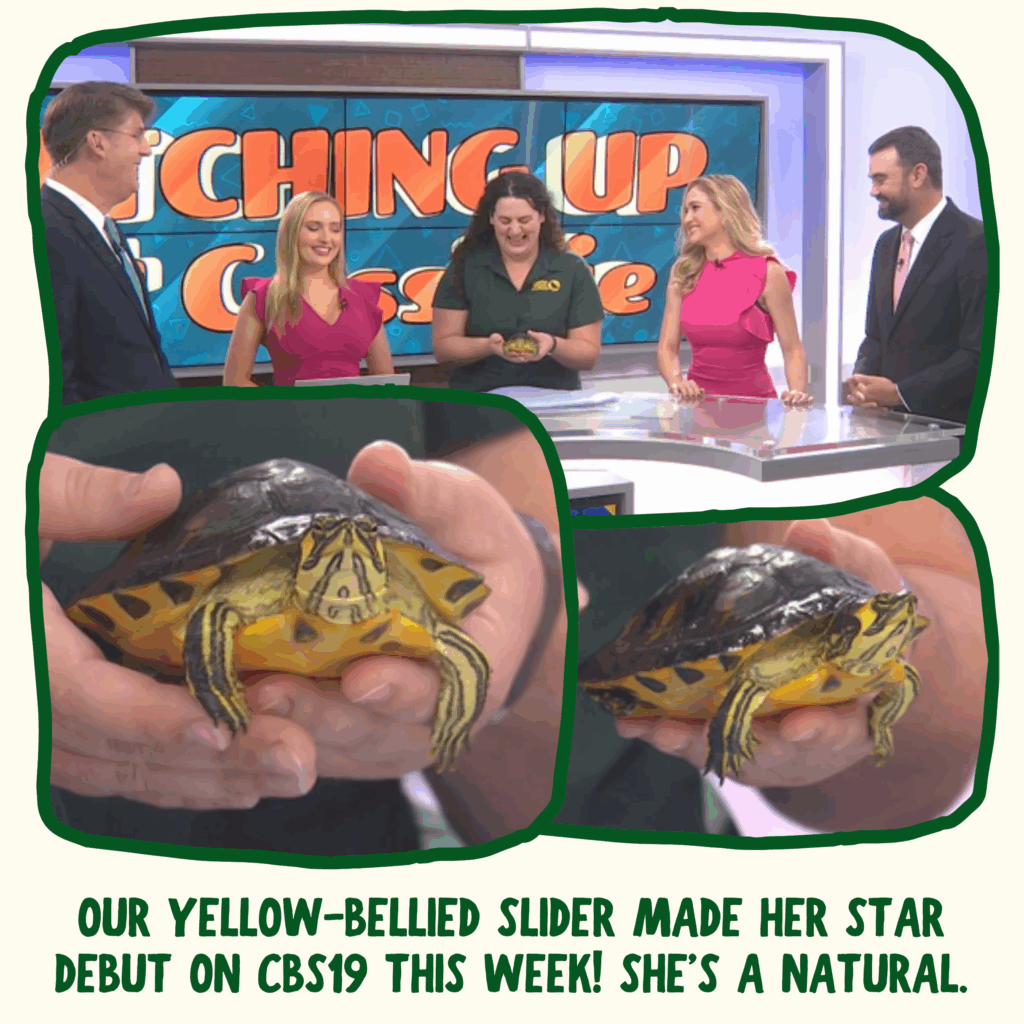They say slow and steady wins the race, but this critter is typically the fastest to greet visitors at Rockfish Wildlife Sanctuary. 🏃
Meet our new Yellow-bellied Slider education ambassador! 💛
This total ham of a turtle doesn’t yet have a name, but you can help change that. Read on to learn how! 👀

One Yellow-bellied Slider’s Harrowing Rescue
This turtle’s rescue story is truly something to shell-ebrate.
What were you doing back in February of 2023? Singing along to Harry Styles’s Album of the Year? Mourning Tom Brady’s (actual) retirement? Smuggling a bunch of turtles out of the country? 🤔
Okay, hopefully you weren’t doing that last one…but someone was, down in Newport News. That February, Virginia Conservation Police confiscated 16 Yellow-bellied Slider hatchlings from wildlife traffickers who were plotting to sell them. It’s unclear whether the traffickers were aiming to sell the sliders as pets or for food or medicinal use, but it was clear that they were breaking the law.

Turtle Trafficking in Virginia
In Virginia, it’s illegal to take native or naturalized turtles from the wild and sell them. It’s also illegal to export wild-caught turtles abroad. Seems pretty straightforward, right?
Apparently not. 😞 In 2023, one Louisa County man pleaded guilty to selling Eastern Box Turtles he caught here in Virginia to buyers around the country. The scheme earned him a felony, since it’s a federal crime to violate state wildlife laws. At one point, the man wrote the following to those who commented on his fishy social media posts: “I know all about the laws and would be stupid to not research first.”
Sadly, our little Yellow-bellied Slider ambassador was just one of more than 600 trafficked turtles confiscated by the Department of Wildlife Resources between 2022 and 2024 alone. 😱 And those are just the ones who were caught!

Turtle trafficking is a much bigger problem than most people think. When folks think of wildlife trafficking and poaching, the first animals that typically come to mind are elephants, tigers, rhinos, pangolins, and other creatures who live far, far away from the Blue Ridge Mountains. Meanwhile, turtle trafficking happens right in our own backyards because it slips under the radar. Poachers can more easily contain a turtle, keep it quiet, and keep it away from probing eyes both online and during transport. 😞

Turtle Trafficking: A Global Crisis
But why are so many people illegally capturing and selling turtles? Money. That Louisa County man who pleaded guilty to trafficking earned nearly $13,000 in just three years from catching and selling wild box turtles online. He sold many to brokers who ship turtles abroad for use in the pet or medicinal trade. One U.S. Fish and Wildlife Service report found that between June 2017 and December 2018, a single trafficking ring smuggled at least 1,500 native turtles from the United States to supply the black-market pet trade in Asia. One undercover “middleman” in this operation (who was actually a federal agent) was sent $78,000 during this time period. 💸 🫠
Bummed out and need a quick pick-me-up? Dogs are crucial in helping prevent wildlife trafficking. Lancer, a “wildlife detector dog” handled by U.S. Fish and Wildlife Service agent Amanda Dickson, sniffs thousands of packages every day in search of smuggled wildlife. Lancer helped bust the aforementioned smuggling ring by detecting a package at Chicago O’Hare filled with turtles. Good boy!

Now, don’t get any ideas! 🙅 That smuggling money might sound like a nice chunk of change, but trafficking is illegal for good reason. Not only can animals spread diseases when they’re introduced to environments they don’t belong in, but poaching turtles has devastating consequences for their species.
Turtles are notoriously slow to reproduce, with most species taking about a decade to reach sexual maturity. Hatchlings make easy prey, so few survive long enough to breed. Taking just one turtle from the environment robs a fragile population of a potential parent. When that happens over and over, entire local populations can collapse. What seems like “just one turtle” to a collector or trafficker can represent generations of lost offspring and a serious blow to the species’ future. 🐢
With this context in mind, we are so glad that on that chilly February day in 2023, VDWR rescued our ambassador Yellow-bellied Slider and its siblings from an unknown fate and taken into state custody.

Picking our New Ambassador Yellow-bellied Slider
You might be wondering why we’re just introducing our “new” ambassador in 2025 when she was rescued back in 2023. It was clear early on that these slider hatchlings could not be released, since VDWR could not confirm whether they had been poached in Virginia or elsewhere. However, they also couldn’t be immediately placed as ambassadors…because they were considered evidence in the trafficking court case! 🧑⚖️
For over a year, the whole squad lived with our friends at the Wildlife Center of Virginia while the state processed their case. About 18 months after their rescue, it was time for one of these bright little sliders to find a forever home at RWS.
While we wish we could have taken all sixteen of the young turtles, Yellow-bellied Sliders tend to be solitary critters. Co-housing them in captive care can lead to aggression and stress. (The others would also be placed at appropriate, licensed facilities.) When our Rehabilitation Program Manager, Elka, went to meet the rescued turtles, one bold little slider swam straight up to her with curiosity and confidence. It was an easy choice, since it sure seemed like she was picking us!

Tiny Turtle, Big Personality!
Since coming home to RWS last summer, this turtle has stolen our hearts…and a lot of our food. 😆 She’ll do anything for a mealworm! She enjoys greeting our team and visitors every day, often paddling over to anyone walking by. Yellow-bellied Sliders are actually semi-aquatic, typically splitting their days between swimming in slow-moving freshwater and basking out in the sun. Our slider ambassador loves to bask as well, but she usually won’t stay basking if you’re nearby. She slides back into the water to come over and see if you’ve brought her a snack.
We’ve even taught our scaly new ambassador some tricks! Our team has trained this charming slider to recognize a target and swim through a hoop. 👏 Well, she used to be able to, until she grew so much that she couldn’t fit in the hoop anymore. She’s gained almost 300 grams since moving in with us and grown about two inches in length. (We’re in the market for a new hoop, don’t worry.) Check out her eating skills! ⬇️
Preventing Turtle Trafficking
While we absolutely adore our slider, and she lives an enriching life with us, we don’t want other turtles born in the wild to end up in captivity due to trafficking. Here’s how you can help stop trafficking in its tracks:
1. Report fishy behavior. 🗣️ If you suspect illegal wildlife collection or sales, contact the Virginia Department of Wildlife Resources via:
- Phone: 1-800-237-5712
- Email: WildCrime@dwr.virginia.gov
- Text: DWRTIP plus your tip to 847411
- Online form
2. If you’re sharing photos of herptiles on social media, do not share your location. ❌📍 Unfortunately, poachers scour social media for location data. If you really want to show off a turtle you’re admiring in that nature-enthusiast Facebook group or on your social media story, keep the spot private. If you must, stick to county-level descriptions (e.g. “Found this beautiful slider in Nelson County today!”).
3. Reconsider that pet turtle. 🧐 Turtles are extremely long-lived animals, sometimes surviving over 100 years! Unless you are ready to commit your entire life to a pet that needs very specialized care — and likely commit someone else’s life to that turtle after you die — a pet turtle is not a good choice for you. If your heart is set on a pet turtle and you are prepared to provide excellent husbandry, search local shelters for turtles before buying from a pet store or online. Always ask for certification that a turtle has been captive bred.

Help us name our Yellow-bellied Slider!
We’re thrilled to give this curious slider a second chance at life — but she still needs a name!
(Or he still needs a name. We’re admittedly not entirely sure yet, since it is difficult to sex juvenile sliders.)
A lucky guest at our Sanctuary Soirée will earn the right to name our new ambassador, who could live with us for the next 40 years. No pressure. 😁
Join us on Friday, November 14th at Pollak Vineyards for an evening of fun in support of RWS’s animal patients and education programs. Our Yellow-bellied Slider will be there to mingle with you!
Whether you get to meet our new slider “coworker” at our Soirée next week or sometime at the Sanctuary, your support is what allows us to give her, and other animals in need, the second chance they deserve. Thank you for reading this month’s Critter Corner!
November 7, 2025
Published:
Be the first to comment!